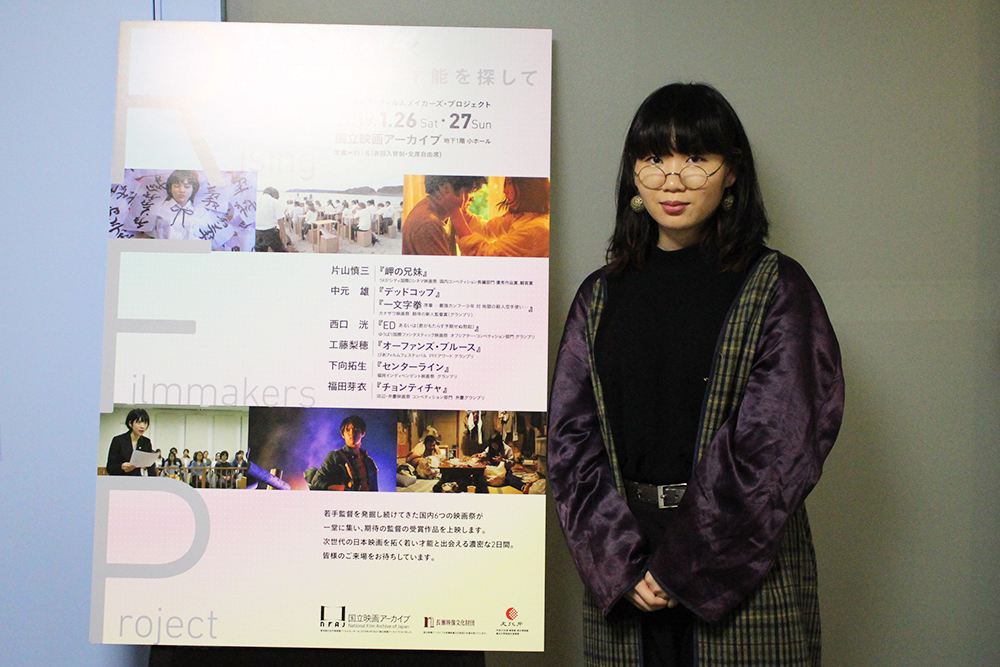2018|Rising Filmmakers Project|Filmmakers’ interviews
You can read filmmakers’ interviews for each screened film in this page. Please enjoy them together with talk events after screenings by filmmakers and related guests.
There are also talks before screenings by film festival representatives available.
(Information on the event, films and filmmakers is here)
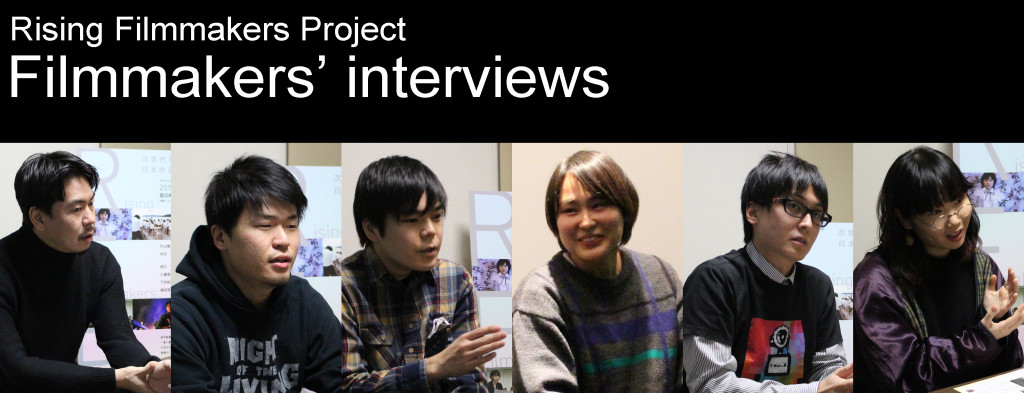
“Siblings of the Cape”
Director: Shinzo Katayama
“Dead Cop”, “ICHIMONJI KEN Prologue Kung Fu Boy VS Murder Karate Man”
Director: Yu Nakamoto
“ED OR (THE UNEXPECTED ERECTION OF YOU)”
Director: Hikaru Nishiguchi
”Orphans' Blues”
Director: Riho Kudo
“CenterLine”
Director: Takumi Shimomukai
“Chonticha at end of the summer”
Director: Mei Fukuda

For information of the film and the director, please visit here.
Tell us how “Siblings of the Cape” was born.
At first it was not about a brother and sister, but a man and a mentally challenged woman. After I cast Yuya Matsuura in the lead, I started discussing with him and we thought the sibling idea was better. Then I rewrote the script. At the start of the shooting I only had the first few minutes of the film written. So, I decided to film season by season throughout one year and to write the script along the way. The production costs were covered by digging into my savings.
The crew consists of junior staff who I worked with when I was assistant director and people who had helped me on my previous smaller films. As for the cast, I had decided on Mr. Matsuura ahead of the others and chose the actress for Mariko, the younger sister (played by Misa Wada) through audition.
How many days did you shoot, and what model camera and editing system did you use?
Production was 20 days. We used mainly SONY FS100. We used some other cameras accordingly, but this was the one we used the most.
Editing was done on Final Cut Pro X. I did the picture edit on X, but then had to export the sound because the systems were not compatible. We had to use different editing systems and finally managed to complete it. It was not all on Final Cut Pro X. And I don’t think I’ll use it again (laughter). I had to go with it till the end just because I had started out on it, but next time I’ll use something else. Not that I would necessarily be editing myself (as on this film).
You worked with directors Nobuhiro Yamashita and Bong Joon-ho as their assistant director. How did those opportunities influence “Siblings of the Cape”?
I had been determined not to refer to their work, but it seems to pop up unintentionally. For example, there’s the scene where (the lead character Yoshio) in running in his dream. At first I shot it from the front, and was content, thinking “That’s a good shot.” But then I remembered how in “The Drudgery Train” (2012, dir: Nobuhiro Yamashita) there was a scene where Mirai Moriyama runs barefoot in a dreamlike sequence. I realized that the two scenes were identical. So I thought it was no good and reshot it from different angles and used multiple shots. There’s also the scene where Yoshio goes to (Mariko’s client) and asks him to marry Mariko and the man is standing behind the glass pane. There’s a similar shot in “Tokyo!” (2008, dir: Michel Gondry, Leos Carax, Bong Joon-ho) and I couldn’t help unintentionally coming up with it.
You were also assistant director on “Mother” (2009, dir: Bong Joon-ho) which was shot in South Korea. Did the experience of an overseas film shoot change anything in you?
I realized that Japan is not everything, and that there are many ways of doing things. They have much more time for production. I feel time is too short in Japan.
As a director, do you ever think you would like to change things from the system you experienced as assistant director?
Lots. For example, work hours. There are fewer young people on the set these days. Maybe not for the camera or lighting crews, but in the directing department there’s no one in their 20s. I guess it has to do with the long working hours and the heavy physical burden. The crew is getting on in age and we can’t do three days and nights in a row any longer. Better pay for the crew is another systematic change I would like to make.
You mentioned in the talk show that you want to keep making films from your own original scripts. Tell us more about this.
It’s not that I wouldn’t do anything else, but I do think there should be more original screenplays. I understand that it is easier to fund a film based on some best-seller novel, or that producers would aim to push an unknown novel or manga to sell better by making a film. But that’s why there are so few films with original stories. That said, I understand the importance of a solid script and proposal that can sell tickets, even in the case of something original. The shift to book-based films happened historically because original stories did not sell. If we can prove that audience will flock to original scripted films, there’ll be a surge in such titles like in the old days.
What kind of support do you think the young generation of filmmakers needs the most?
Since I had been most concerned about the distribution and promotion of “Siblings of the Cape” I was overjoyed to get support for that. People are always full of energy to be creative, to make films. It’s fun coming together as a team and doing the production together. But more important is “how to launch it into the world.” It’s hard. You could say that there are nowadays many outlets for releasing films, but I do think it’s important to have an audience see the film on a cinema screen. The filmmaking craft should aim at being seen on the big screen.
Any message for the next generation of creators who aspire to make films?
They should experience an assistant director position. They should go through the directing department of a professional film production. For about ten years. It’s the basis of it all, nothing good is born without training. A student filmmaker might manage to create something unprecedented just by an instinctive talent. But I still recommend being an assistant director. You should work with different directors, study well, and cultivate experience so that you will end up with more pockets to choose from.
January 26, 2019 at National Film Archive of Japan
Interviewer / Editor: Natsumi Yoshida
Translator: Asako Fujioka
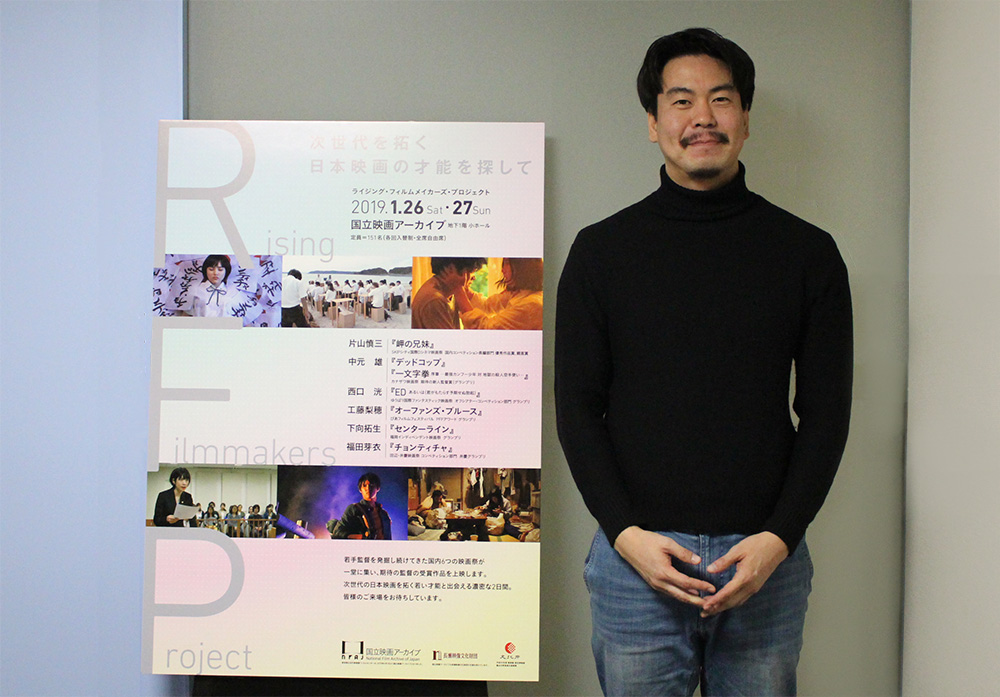

For information of the film and the director, please visit here.
How did you like the talk show with Yuji Shimomura?
I am just a movie buff who was overjoyed to meet the person of my dreams. Once I met him, we were able to have a normal conversation and he even gave me some advice. I told him “I’m having trouble with this,” and he gave me suggestions like, “why don’t you try this?” I thought, “That’s amazing, I never thought of that,” and just that exchange was so helpful for me.
At Kanazawa Film Festival, there was high praise for your team. How did you find your crew and cast?
They are classmates at a vocational school I am currently enrolled in. There’s an acting course and production course. I made friends with people in the acting course and we decided to make a film together.
As a film student, how much money and time did you spend on this film?
All the budget came out of my own pocket – For “Dead Cop” it was maybe 200 to 300 thousand yen. I didn’t even pay (the staff and cast) train fare, so it was really inexpensive. I filmed almost everything in the neighborhood. Only the school scenes were shot in an abandoned school in Nagano – it was the alma mater of one of the staff members who managed to rent it for us. We rented a car and traveled up the highway twice, so that was costly. Other costs included costumes, fake blood, and so forth. That was about it. For “ICHIMONJI KEN” I purchased a camera. For around 400 thousand yen, the most expensive purchase for us. Aside from the camera, I think we spent around 500 thousand.
We filmed “Dead Cop” in 15 or 20 days, while “ICHIMONJI” took around 30 days. We had to shoot lots of action scenes so that took a lot of our time.
So you didn’t rent equipment from the school.
In fact, the equipment belonging to my school is not that great. For lights, we can manage to work with anything that beams light, so we used some broken ones. But we knew that the camera had to be a good one, because otherwise whatever you do with the lights it’ll never do the job. So we bought a camera and used the microphones, lights, and tripods from school. “Dead Cop” was filmed almost entirely with my own equipment, including the camera that I’d been using for a long time. It was Canon EOS 7OD. We shot “ICHIMONJI KEN” on a Canon, too. It was EOS 5D Mark IV. We edited on Adobe Premiere.
You worked as a web designer for four years before entering film school. Why did you decide to enroll in a vocational school to achieve your longtime dream of becoming a filmmaker?
There are several paths to becoming a film director: Working as an assistant director for many years and then making your directorial debut. Getting awards at film festivals and getting to meet producers. The assistant director thing is for people who are really smart and receptive with people – not for me. So I thought I would aim for the film festival prizes. But I just couldn’t imagine myself going to Tokyo alone, having to make friends, gather the crew through an open call, do the film, and win a prize. So instead, I entered the school and made the film with my classmates and aimed for the festivals. The school I chose was a three-year course. It was longer than my two-year design course (before becoming a web designer) which I had thought too short. A three-year course would allow me to make films for at least two years, I thought. The school also had an acting course, so I thought it would not be hard to find actors.
In the end of December last year (2018), I finished shooting my graduation thesis. It was a sci-fi film for which I managed to get a million yen from the school to build a set that looked like a room in a spaceship. There was an art department in the school for students who wanted to go into production design and there’s a class teaching how to build sets. Every year, the teacher would write a script, students from the acting course would be cast, and a film would be made. It was usually not a work of passion, but just a class project in order to work on set decoration and production design. I happened to be friends with someone in the art department and I asked, “Could I make my film through this class?” The school didn’t have a scholarship system for such projects like mine, but I took advantage of the acclaim of my films at several film festivals and made the pitch. “I did this much, so let me make the film in class,” I said, and negotiated persistently until I got it.
So the award at Kanazawa Film Festival was the trick?
Yes, and also the Audience Award at Pia Film Festival was a gamechanger. Nobody on the faculty had ever been nominated to PFF, so that was the big bargaining chip.
Would you like to take your film to festivals outside of Japan?
Yes. I had always thought that my films, as genre films, would be popular at festivals overseas. I just never knew how to apply and also the films were not subtitled in English. I was hoping doors would open somehow but didn’t know how to go about it. PFF made English subtitles for “ICHIMONJI KEN” after it was chosen for the competition and is apparently showing it to programmers from international film festivals when they visit Japan.
Any message for the next generation of creators like you who aspire to make films?
I’m still on the road myself, but there is something I often tell my younger colleagues. If you have three years in school, you should use that time to pound those films out and send them to film festivals, or else you will find yourself in the second year of school when the technical crew start interning for professional productions. You lose the timing to shoot your films. Once you are in the third year, you have to start job hunting yourself. Even if you are aiming to direct, the mood shifts to “maybe you should just get a job” and everyone files up to join companies. So if you are serious about becoming a director, you should start shooting with your friends right away, and you should also work on revising your script.
January 26, 2019 at National Film Archive of Japan
Interviewer / Editor: Natsumi Yoshida
Translator: Asako Fujioka


For information of the film and the director, please visit here.
How did it come that you are in charge of multiple roles – director, script, and editor?
There was a script I wanted to film, and it was my own script. So it was obvious I should direct it. For editing, the reality was that there was no one else. But I did want to challenge myself to how far I could go by myself. There was nobody to handle costumes, so I ended up doing that too.
How did you think up the theme to this film?
I suffer of frequent urination from psychological causes. It used to be the source of anguish for me, but people didn’t really understand. So when I decided to write a screenplay, I wanted to take it up as something very close to me. And then, when I thought about visualizing it, I thought that erectile disfunction could be more interesting. So I replaced the urination problem with ED and wrote up the script.
Student filmmakers often find it hard to find cast of different ages. How did you cast the parents of the high schoolers, the teacher, and the actor who plays God?
There’s an online bulletin board calling for actors where I posted a call. There weren’t too many people who responded to my film because of the topic, so I asked a classmate director whether I could “invite actors who responded to your call.” In the end, Katsuya Tanabe who played the teacher was the only actor I got through the website.
How did you fund the film? Tell us about which equipment and editing program you used.
The production fee was covered by all classmates who were participating in this graduation film. It came to around 500,000 yen. I covered half, and the others pitched in to pay for the rest. Transportation was expensive but I guess the props like the desks were the biggest costs.
For filming we used Blackmagic Design’s Pocket Cinema Camera, which belonged to the DOP. We borrowed a Zeiss lenses from the university. They have good cameras, too, but sometimes the shooting schedule would overlap with other crews (and was inconvenient). For editing, I used Adobe Premiere at the university facilities and also on my own computer.
How many days did you film?
Around ten days. It was April when I showed my professor the first draft of the film, and production was in August, so I would say it took four to five months all together.
In the talk event, you mentioned that there’s a school course using film stock. Did you also have the chance to work with film?
Yes. I used 16mm and 35mm film. There were often exercises using 16mm – mostly 10-minute works. At the time I was cinematographer and someone else directed. The film was about life after death. On 35mm we made shorts of 2 to 3 minutes. We took turns being director and so I experienced being director and cameraman. It was a few men eating together and then they eat too much and puke. I was impressed with shooting on film, it was really cool. I had lots of fun. I liked the tension of filming a one-time-only shot that you could not retake.
For this film you made your first mid-length work. What were the difficulties on working with length?
The more scenes there are, the more preparation you are stuck with. I really recognized how much work goes into making films.
As a young filmmaker yourself, what kind of support do you think this generation of filmmakers needs the most?
There’s not enough production staff. I can’t ask someone who’s graduated and company-employed to help me, and it’s not easy to find new staff. The staff of “ED” are all working in the industry now.
Any message for the next generation of creators who aspire to make films?
It’s important not to forget your gratitude to the people around you, because films are made only with the cooperation of many.
January 27, 2019 at National Film Archive of Japan
Interviewer / Editor: Natsumi Yoshida
Translator: Asako Fujioka
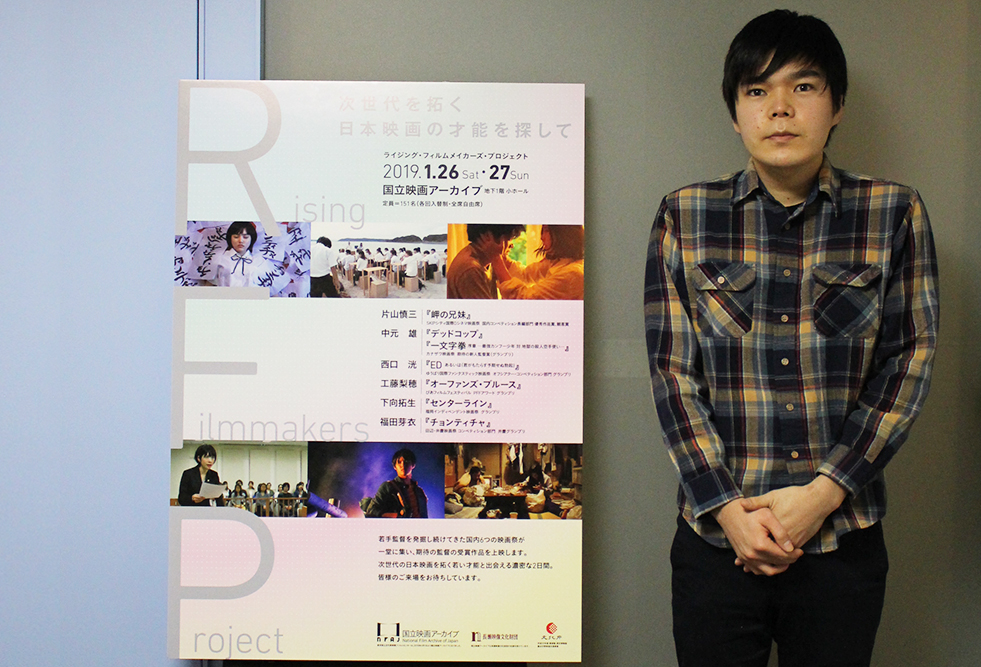

For information of the film and the director, please visit here.
How was your talk event with Koji Fukada?
When I was a junior in university, I once attended a lecture event hosted by the Independent Cinema Guild, headed by Mr. Fukada. I went to the after-party and managed to have a conversation with him then. At the time I had no idea anything like this would happen, so it was just like a dream come true. I was so grateful he gave me detailed advice.
You decided to do film after reading Kanako Nishi’s novel “Sakura”. Why “make a film” and not “write a novel”?
I thought about how I could share the emotions I felt from reading the book with others. It was not about writing another book but rather existing in the same time and space as others, so they can partake of my inspiration. That’s cinema, I thought, and chose film as my medium.
You have made two shorts of 20 – 30 minutes during your years at Kyoto University of Art and Design. This is your first feature. What were the difficulties of making a long film?
All in all, it was just lots of fun and I don’t remember anything being “difficult or tough.” But since we had to travel long distances to our locations, I was always concerned of car accidents, since members of our cinematography team were driving. Also, it was tough getting up at 3 am every morning since we were shooting the rising sun a lot.
You mentioned in the talk event that you filmed in seven prefectures. How long did you spend location scouting?
About a month. We were all seniors and had almost no more mandatory classes, so it was pretty flexible. When I first thought about this film, it was the image of the market that came to mind. Ideal would have been filming in Thailand or somewhere in Asia where there’s a bustling market. I kept searching online to see if I could find something like that in Japan, and then I did. “Got it! Let’s go here,” I told everyone. That’s how we decided on where to shoot the market scene. But the location for the last scene was hard to find, and we kept searching throughout the production phase.
How did you finance the film? Did you have a film festival premiere in mind from the start?
Since this is a graduation film, the university put in around 250,000 yen. But that wasn’t enough, so I poured in 300,000 yen I had earned working in a bread factory, and the staff pitched in to make up for the rest. The budget amounted to around 800,000 yen. I worked part time while I wrote the script, and spent many months doing as many shifts as possible, whenever I had time. The most expensive cost was gasoline for the car, when we needed to travel far. We rented equipment from the school. We used a Panasonic GH4 for the filming.
Once we were done, there was no doubt about it – “We go to PFF.” Everyone else making films was submitting, without fail, to PFF. For indie filmmakers, PFF is the absolute choice. Although I applied to all other film festivals left and right, too.
Were you sure about editing by yourself?
No, not really. If there had been someone else, I would have worked with them, but everyone’s so busy. I do feel that I need to improve on my editing skills. I learned the basics of how to use the editing program in my freshman class, under Kann Suzuki, who was also advisor for my graduation thesis professor.
For this film I used Adobe Premiere and worked at home. It took about a month to edit.
What was the best thing about learning filmmaking at a university?
Meeting people was the biggest thing for me. Leading daily life side by side with them, you can’t help but talk about movies. Spending four years in that kind of environment allowed me to focus absolutely on film. That was definitely meaningful.
Did winning the PFF Award change anything in your environment?
People came to me asking, “Do you have a project to pitch?” It was incredible that chances to make my own film are coming my way. Once you are out of university, it’s usually not easy to make independent films.
Any message for the next generation of creators like you who aspire to make films?
I learned through this production that you have to be strong and committed, like “This will be the last one” in order for others to understand. I was determined – if this graduation film “Orphans' Blues” didn’t make it into any film festival, I would never make another film. “Maybe this will really be the last film in my life.” That’s how passionate you have to be.
I still wonder whether I will be able to continue filmmaking if I had nothing more I wanted to express. I hope to keep wrestling with each and every project with my entirety, as if there were no tomorrow.
February 1, 2019 at National Film Archive of Japan
Interviewer / Editor: Natsumi Yoshida
Translator: Asako Fujioka
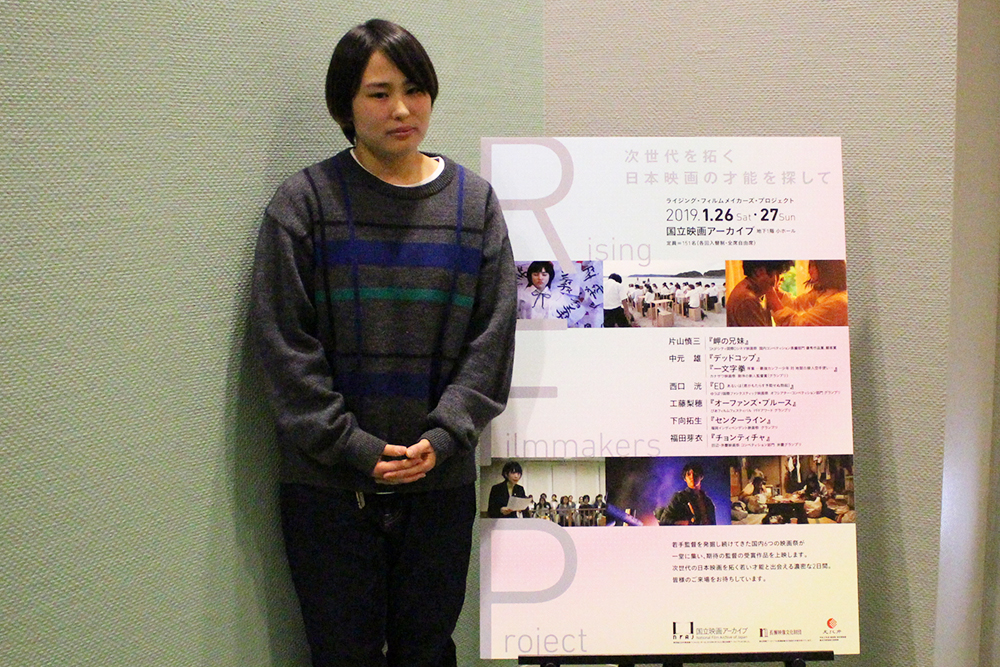

For information of the film and the director, please visit here.
How was your talk event with Takashi Yamazaki?
I was struck by Mr. Yamazaki’s words – “Entertainment should be easily understandable.” When emotions get too complicated within the fixed time frame of cinema, audiences can get confused where to empathize. I realized that I should simplify and strengthen the portrayal of emotion. I want to keep making films that depict “a future as an extension of today” – the reality that is just there in front of us.
Why did you think of making a film on the subject of artificial intelligence?
I had made a short film (“N.O.A.” 2015) about iPhone’s Siri speaking with a human. When this film was praised in a film competition, there were some negative comments like “Seeing a machine acting isn’t exciting enough to be awarded.” My response was, “What if robots get closer and closer to humans and they start to look exactly like people? Will they (the critics) still be saying that?” –This became a motivation to make this film.
I also wanted to make a film about “how do we deal with emotions of AI robots?” I had always liked court dramas and one day thought of attending a trial. When I was in court, I noticed that the discussion was just like a Turing test. My current job is a software engineer and I’d also studied the field in university. The Turing test is, in a few words, a test that evaluates the level of artificial intelligence. When you chat with an AI and you can’t recognize whether you are talking to AI or a human, the development of that model is considered completed. The interesting part is, the decision has nothing to do with the physical AI parts. The judgment is passed only through its performance in communication.
The courtroom is the same. In some trials, there’s a discussion whether the defendant had intention to kill or not, but you can’t use a microscope to see inside the human mind. So how do you find out? It’s through the responses to the defense lawyer and prosecutor’s questions and physical evidence and such things that a total stranger presumes what is inside the defendant’s mind. I noticed that this is so similar to the Turing test. That’s why I connected the two and came up with a court case where the accused is a robot.
I noticed that your credits include names of attorneys. How did you come to ask them to assist you? How long did you spend on the production?
In October 2015 I made the short film I mentioned earlier. After it received acclaim at the end of the year, I started thinking vaguely about this next story in February to March 2016. I started reading up on trial cases in the library. But the setup of convicting a robot is totally unrealistic and there was a lot I didn’t understand through books, so I thought I’d have to discuss it with a real attorney. Since the film deals with “intent of murder,” I was researching how intent is actually proven in court when I came across a lawyer’s blog. This attorney often volunteered to serve as state counsel for defendants and also blogged about “how intent is recognized,” and how “this is what we lawyers do in response.” There were entries about daily stuff too, so I figured maybe the lawyer would agree to advising my film and wrote an email.
That was around May 2016. I decided to apply to the film project competition TSUTAYA CREATORS’ PROGRAM and though not really writing the script in earnest, I started to put a production plan together. Alas I didn’t get the grant so I said, okay let’s do it solo. I started to work on my script at the end of 2016. The filming was from the end of April to May 2017. It took eight days to shoot.
All the AI robots including MACO2, the defendant, look like they’re very high quality. Did you learn how to build them yourself?
Yes. It wasn’t conscious studying, but I kind of learned by trial and error. I had been worried that the moveable parts of MACO2 would be hard to build, but once I started it was not hard. I just stuck two motors together. The motors were the most expensive parts – 10,000 yen for two, but I was able to buy the body parts at a junk shop so that didn’t cost too much.
What cost the most?
Obviously it was the actors’ fees. Also, the rental fees for the courtroom. That was not a professional set but a university classroom for law studies. I paid the designated rental fee to the school. The entire budget, well maybe it depends on what we include as production cost, but it cost 1.5 million yen until completion. It was all my own money, and included 500,000 yen awards money from the short I had made. But I had to chip at it for travel fees to attend film festivals, so it’s not like it was fully available for the production.
What equipment did you use for the filming?
Panasonic GH4. I came across my director of photography JUNPEI SUZUKI on a facebook post that said “This is the type of work I do, please contact me for hire.” I liked his work so I got in touch. Then I found that by chance, he is from Ichinomiya City, Aichi Prefecture – the shooting location of the film.
You are making films while working fulltime. What is difficult about that, and how do you manage?
In my case, I work better under limitations. My short film from 2015 “N.O.A.” was a one-shot film of 15 minutes filmed entirely in a car. The characters were just Siri and one man – basically a one-man act.
Sometimes my work forces me to go suddenly on business trips and my weekends are taken up. That’s why I can’t do big productions with lots of people. But I still wanted to do something interesting and thought, well if it’s a one-man act, I won’t have to trouble too many people even if something came up and I had to cancel the shoot. Okay, let’s try it out, I thought.
The interesting thing about “CenterLine” and the court drama is that it’s all dialogue. If you wanted a cop flick, you might need a building to explode. I’m all for that, but it’s not feasible as an independent film (that's low budget). In court, you just use the actor’s lines to explain that “At xx o’clock the building exploded.” That’s so great. That’s one of the reasons why I wanted to do a courtroom film. Also, the whole thing takes place indoors so sound recording is easier than going outdoors on location. It works out well.
Any message for the next generation of creators like you who aspire to make films?
I have two conflicting emotions in me: “I should believe in others” and “I shouldn’t believe in others.” I know you should give free hand to whoever you can really trust. But to someone you find even a bit doubtful, you should be suspicious. For “CenterLine”, I was very lucky with the people who helped me. Fukuoka Independent Film Festival, the prize that allowed me to show the film at Cinema ROSA, also the many places that showed the film, including my hometown Fukui. The mother of a childhood friend is a Fukui Prefectural councilor who suggested to me, through my friend, that “This is good, so let’s organize a screening sponsored by me.” I believe it makes sense to be respectful of human relationships that come your way.
January 27, 2019 at National Film Archive of Japan
Interviewer / Editor: Natsumi Yoshida
Translator: Asako Fujioka
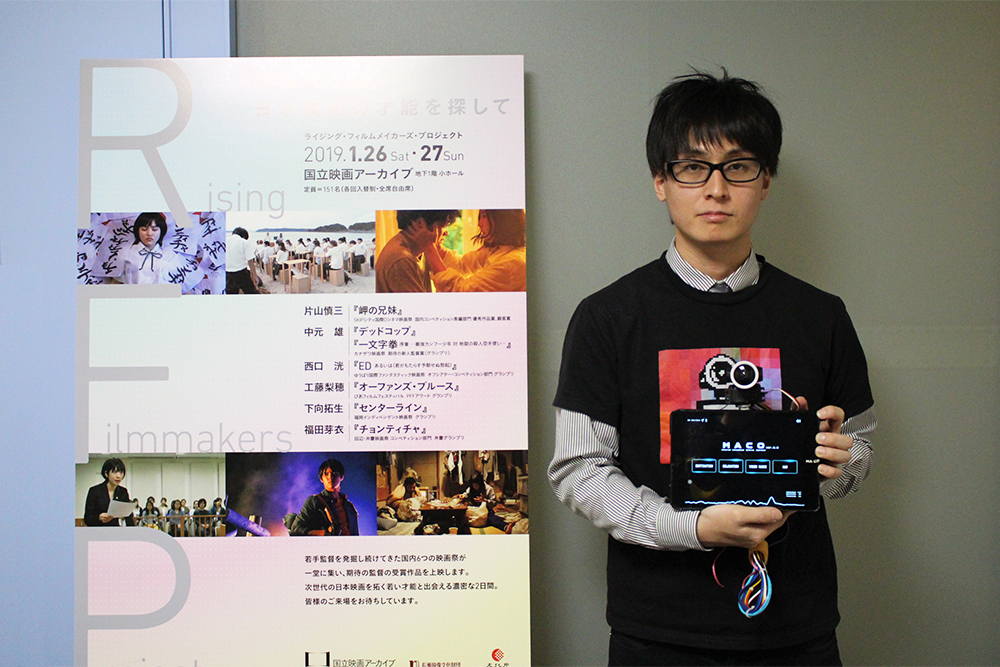

For information of the film and the director, please visit here.
I heard “Chonticha at end of the summer” was a project initiated by Chonticha Takahashi, the director of photography on this film. How did you go about preparing for the production once you were designated director?
I’d never been interested in foreigners living in Japan nor social issues for that matter. But when the task of making this film came my way, I had to face the facts. I talked a lot with Chonticha Takahashi and went places for research, including Myanmar restaurants. I also read extensively and did research on cooking, because I thought food was important. But since I wanted to depict the foreigner in Japan as someone not so different from us (Japanese), it was my own emotions when talking to Chonticha Takahashi that impacted the research the most.
How did you fund this thesis film? What was the costliest in the production?
The school provided support through equipment rentals, but the bulk of the budget was covered by the staff. Around twenty of us shared the burden of around 1.5 million yen. The most expensive item was location (rental fees). I didn’t really think too much about how we were using the money. We couldn’t decide on the filming location until the very end. Eventually, we rented a house for two weeks to use as Chonticha’s residence. It was a house that was regularly rented out (for filming).
Chonticha’s Myanmarese mother and Thai father were played by Japanese actors. How did you direct them?
At Myanmar restaurants (where I visited for research), I kept going back to find out how Myanmar people in Japan spoke. They actually speak like the Japanese do. They even look Japanese in their daily lives. I chose the two actors (who played the parents) through auditions and taught them the speech habits I had learned at the Myanmar restaurants. During the filming, I would be able to guide them like “Oh, that’s too over the top,” and so on.
What was the best thing about learning filmmaking in a school?
That’s a tough question. The school can teach you technical things, but I don’t believe people can teach you how to direct.
I’ve led a pathetic life and so my first directorial film (in school) was about the self that I wasn’t keen to reveal – my deceipt and weaknesses. That was a great experience. It came out of the classes of two teachers who were filmmakers. They always used to tell us “Show the holes of your asses” (through filmmaking). So it was in school that I learned to put my shortcomings on display without shame. That was the biggest lesson I learned.
As a young filmmaker, what kind of support do you think your generation needs the most?
Making (a film) is hard but surprisingly possible. If you have the money, and also if there are people willing to help make it or act in it, you can shoot. But the most difficult is getting an audience to see it. I have started to prepare for my film release in Theatre Shinjuku and Osaka’s Cine Libre Umeda – this opportunity is the prize I won at Tanabe-Benkei Film Festival. We meet (with the cinema managers) every month and discuss marketing tactics and how to sell the film. It’s a good chance to come face-to-face with my own film once again.
Any message for the next generation of creators who aspire to make films?
I can’t say much, because I haven’t made all that many films. But maybe I can say, as I did earlier, that if you look carefully at what you hate about yourself, what is deplorable, embarrassing, and what you want to hide the most, and realize that it can be interesting, and if you can get so involved in yourself that those things start to fascinate you, filmmaking will be so much fun and you’ll also gain an exciting perspective on yourself.
January 27, 2019 at National Film Archive of Japan
Interviewer / Editor: Natsumi Yoshida
Translator: Asako Fujioka
